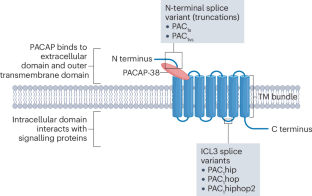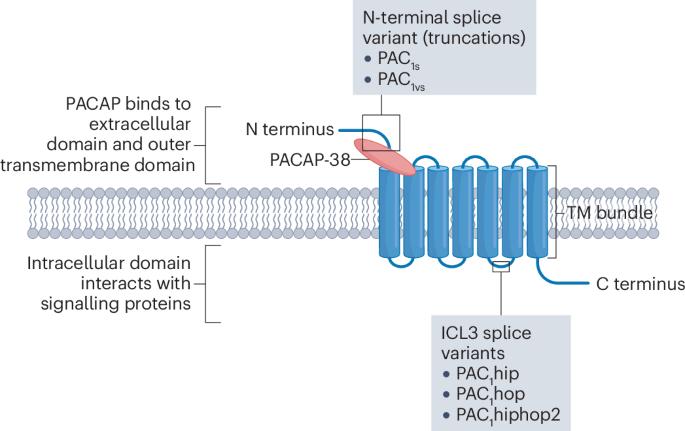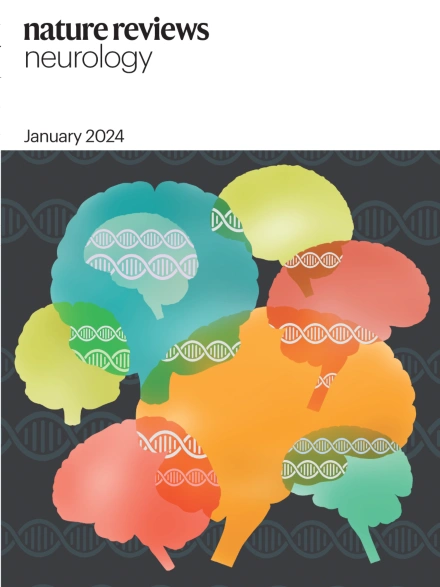将垂体腺苷酸环化酶激活多肽信号作为偏头痛的治疗靶点
IF 28.2
1区 医学
Q1 CLINICAL NEUROLOGY
引用次数: 0
摘要
偏头痛是一种致残性神经系统疾病,影响着全球超过 10 亿人。其临床表现以反复发作的头痛为特征,通常伴有畏光、畏声、恶心和呕吐。尽管人们对偏头痛的发病机理还不十分清楚,但越来越多的证据表明,特定的信号分子参与了偏头痛发作的诱发和调节。这些信号分子包括垂体腺苷酸环化酶激活多肽(PACAP),这是一种血管活性肽,通过静脉输注给偏头痛患者使用可诱发偏头痛发作。将PACAP与偏头痛发病机制联系起来的发现促使人们开发出了针对PACAP信号的药物,一项II期试验也证明,针对PACAP的单克隆抗体可有效预防偏头痛。在本综述中,我们将探讨 PACAP 信号的分子和细胞机制,揭示其在三叉神经血管系统和偏头痛发病机制中的作用。然后,我们讨论了针对 PACAP 信号治疗偏头痛的新兴治疗策略,并探讨了将现有知识转化为偏头痛临床治疗方法所需的研究。本文章由计算机程序翻译,如有差异,请以英文原文为准。


Pituitary adenylate cyclase-activating polypeptide signalling as a therapeutic target in migraine
Migraine is a disabling neurological disorder that affects more than one billion people worldwide. The clinical presentation is characterized by recurrent headache attacks, which are often accompanied by photophobia, phonophobia, nausea and vomiting. Although the pathogenesis of migraine remains incompletely understood, mounting evidence suggests that specific signalling molecules are involved in the initiation and modulation of migraine attacks. These signalling molecules include pituitary adenylate cyclase-activating polypeptide (PACAP), a vasoactive peptide that is known to induce migraine attacks when administered by intravenous infusion to people with migraine. Discoveries linking PACAP to migraine pathogenesis have led to the development of drugs that target PACAP signalling, and a phase II trial has provided evidence that a monoclonal antibody against PACAP is effective for migraine prevention. In this Review, we explore the molecular and cellular mechanisms of PACAP signalling, shedding light on its role in the trigeminovascular system and migraine pathogenesis. We then discuss emerging therapeutic strategies that target PACAP signalling for the treatment of migraine and consider the research needed to translate the current knowledge into a treatment for migraine in the clinic. Pituitary adenylate cyclase-activating polypeptide signalling has been linked to migraine pathogenesis. In this Review, Ashina and co-workers explore the molecular and cellular mechanisms of pituitary adenylate cyclase-activating polypeptide signalling and discuss emerging therapeutic strategies to target this pathway for migraine treatment.
求助全文
通过发布文献求助,成功后即可免费获取论文全文。
去求助
来源期刊

Nature Reviews Neurology
医学-临床神经学
CiteScore
29.90
自引率
0.80%
发文量
138
审稿时长
6-12 weeks
期刊介绍:
Nature Reviews Neurology aims to be the premier source of reviews and commentaries for the scientific and clinical communities we serve. We want to provide an unparalleled service to authors, referees, and readers, and we work hard to maximize the usefulness and impact of each article. The journal publishes Research Highlights, Comments, News & Views, Reviews, Consensus Statements, and Perspectives relevant to researchers and clinicians working in the field of neurology. Our broad scope ensures that the work we publish reaches the widest possible audience. Our articles are authoritative, accessible, and enhanced with clearly understandable figures, tables, and other display items. This page gives more detail about the aims and scope of the journal.
 求助内容:
求助内容: 应助结果提醒方式:
应助结果提醒方式:


